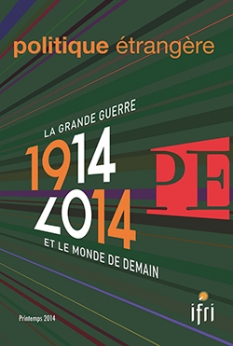
Politique étrangère n° 1/2014
Pour acheter ce numéro, contactez-nous
Recevez les numéros de l'année en cours et accédez à l'intégralité des articles en ligne.
La Première Guerre mondiale a permis l’émergence de la discipline des relations internationales, mais ce sont la Seconde Guerre mondiale puis la guerre froide qui en ont favorisé le développement. Le premier conflit mondial demeure une réserve fertile d’exemples et d’arguments sur les causes et le déroulement de la guerre et de la paix. Mais sa place centrale dans cette discipline est contestée par la révolution nucléaire, la force des nationalismes ou le rôle nouveau du terrorisme.
What is the significance of the First World War to International Relations (IR) theory ? We argue that World War I planted the seeds for International Relations theory, but it was World War II and the Cold War that fostered its growth. By exposing shocking deficiencies in thinking about world politics, World War I drastically expanded the audience for IR thought, stimulated academic study of the subject, and set the scene for the ferment that followed. The First World War remains a critical case in IR research and a fertile basis for arguments on the causes and course of war and peace. But its central place in the field is increasingly contested because of the nuclear revolution, the disintegrative force of nationalism, and the salience of terrorism.